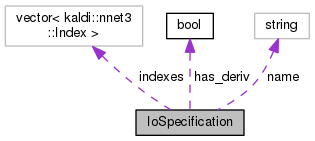#include <nnet-computation.h>

Public Member Functions | |
| IoSpecification () | |
| IoSpecification (const IoSpecification &other) | |
| IoSpecification (const std::string &name, const std::vector< Index > &indexes, bool has_deriv=false) | |
| IoSpecification (const std::string &name, int32 t_start, int32 t_end) | |
| void | Print (std::ostream &os) const |
| This function is for printing in a human-readable way, for debugging. More... | |
| void | Swap (IoSpecification *other) |
| void | Read (std::istream &istream, bool binary) |
| void | Write (std::ostream &ostream, bool binary) const |
| bool | operator== (const IoSpecification &other) const |
Public Attributes | |
| std::string | name |
| std::vector< Index > | indexes |
| bool | has_deriv |
Definition at line 72 of file nnet-computation.h.
|
inline |
Definition at line 78 of file nnet-computation.h.
|
inline |
Definition at line 80 of file nnet-computation.h.
|
inline |
Definition at line 82 of file nnet-computation.h.
References MiscComputationInfo::operator==(), and MiscComputationInfo::Print().
| IoSpecification | ( | const std::string & | name, |
| int32 | t_start, | ||
| int32 | t_end | ||
| ) |
| bool operator== | ( | const IoSpecification & | other | ) | const |
Definition at line 1109 of file nnet-computation.cc.
References IoSpecification::has_deriv, IoSpecification::indexes, and IoSpecification::name.
| void Print | ( | std::ostream & | os | ) | const |
This function is for printing in a human-readable way, for debugging.
Output ends in a newline.
Definition at line 993 of file nnet-computation.cc.
References kaldi::nnet3::PrintIndexes().
| void Read | ( | std::istream & | istream, |
| bool | binary | ||
| ) |
Definition at line 1006 of file nnet-computation.cc.
References kaldi::nnet3::ExpectToken(), kaldi::ReadBasicType(), kaldi::nnet3::ReadIndexVector(), and kaldi::ReadToken().
| void Swap | ( | IoSpecification * | other | ) |
Definition at line 1000 of file nnet-computation.cc.
References IoSpecification::has_deriv, IoSpecification::indexes, IoSpecification::name, and kaldi::swap().
| void Write | ( | std::ostream & | ostream, |
| bool | binary | ||
| ) | const |
Definition at line 1019 of file nnet-computation.cc.
References kaldi::WriteBasicType(), kaldi::nnet3::WriteIndexVector(), and kaldi::WriteToken().
| bool has_deriv |
Definition at line 75 of file nnet-computation.h.
Referenced by BatchedXvectorComputer::BatchedXvectorComputer(), DecodableNnetSimple::DoNnetComputation(), kaldi::nnet3::GetChainComputationRequest(), kaldi::nnet3::GetComputationRequest(), kaldi::nnet3::GetDiscriminativeComputationRequest(), kaldi::nnet3::IoSpecificationIsDecomposable(), IoSpecification::operator==(), kaldi::nnet3::RunNnetComputation(), and IoSpecification::Swap().
| std::vector<Index> indexes |
Definition at line 74 of file nnet-computation.h.
Referenced by BatchedXvectorComputer::BatchedXvectorComputer(), kaldi::nnet3::ComputeSimpleNnetContextForShift(), DecodableNnetSimple::DoNnetComputation(), kaldi::nnet3::GetChainComputationRequest(), ComputationGraphBuilder::GetComputableInfo(), kaldi::nnet3::GetComputationRequest(), kaldi::nnet3::GetDiscriminativeComputationRequest(), IoSpecification::IoSpecification(), kaldi::nnet3::IoSpecificationIsDecomposable(), IoSpecification::operator==(), kaldi::nnet3::RunNnetComputation(), and IoSpecification::Swap().
| std::string name |
Definition at line 73 of file nnet-computation.h.
Referenced by BatchedXvectorComputer::BatchedXvectorComputer(), kaldi::nnet3::ComputeSimpleNnetContextForShift(), DecodableNnetSimple::DoNnetComputation(), kaldi::nnet3::GetChainComputationRequest(), ComputationGraphBuilder::GetComputableInfo(), kaldi::nnet3::GetComputationRequest(), kaldi::nnet3::GetDiscriminativeComputationRequest(), kaldi::nnet3::IoSpecificationIsDecomposable(), IoSpecification::operator==(), kaldi::nnet3::RunNnetComputation(), and IoSpecification::Swap().